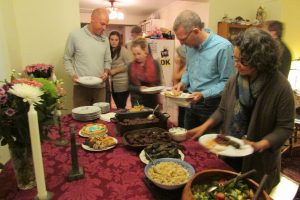This is the last of the series I am posting on Everyday Spirituality. The previous posts are Being Attentive… to Ourselves, Being Attentive… to Others; and Being Attentive to God’s World.
Becoming fully attentive to ourselves, to others and to God’s world transforms us and our ways of looking at God and God’s world. And transformation means change, not just to ourselves but to the practices that shape our faith and our lives. As I learned to listen and became more attentive to myself and to others I realized that the spiritual practices I engaged in needed to change. I found myself craving for new expressions of faith that rooted my in my faith and the community of which I am a part.
Some of this creativity has impacted my individual practices like the Advent garden I described at the beginning of Advent last year. But it has also transformed my way of interacting with others. For Tom and I hospitality is a central value of the kingdom of God, not just a way to sit down and share meals with friends and strangers, but literally a doorway into the eternal world of God.
One of my favourite stories in the Bible is of Jesus’ encounter with his disciples beside the sea of Galilee after his resurrection. It is hard to imagine that in the few days Jesus has to let the world know about his resurrection that he could possible take time not just to eat with his friends but to actually make breakfast for them. It is a beautiful story that reminds me of the centrality of hospitality and of table fellowship, a powerful spiritual practice that few of us recognize as such.
There are other Biblical stories that can be transformed into spiritual practices for our society today too. When I was on the mercy ship Anastasis, we regularly held Highways and Byways banquets where crew members went out and invited whoever they met to come to the ship for dinner. It was a little scary because you never knew who would come – prostitutes, transvestites, homeless people, shipyard workers, business men and women all rubbed shoulders together at these celebrations. It was an intense spiritual practices that had a huge impact on me and on many others.
Creative spiritual practices can root us in our neighbourhoods in wonderful ways. Buying coffee at the same cafe each day is a wonderful example. It can support local businesses and help them to flourish, introduce us to other people in our neighbourhoods and possibly establish new friendships that can root us even more deeply into the community.
If we reimagine our spiritual practices as practices that make us more attentive to ourselves, to others and to God’s world what differences would it make to how we practice our faith? A couple of years ago one of our summer interns walked the seven miles into Seattle from our house looking for and photographing emerging glimpses of God’s kingdom. It is a spiritual practice I would love to carry out too and then follow it up with some brainstorming on how to grow those sprouting kingdom plants.
Each of us has unique ways of expressing our spirituality. As Paul Sparks said in his presentation at the Inhabit Conference this morning, we need to learn to see with new eyes and recognize the gifts God has planted in the most unexpected places. We need to stir our imaginations and create new possibilities that anchor us in the foundations of our faith and yet give freedom to the unique expressions God has placed within us. What could they look like for you?

